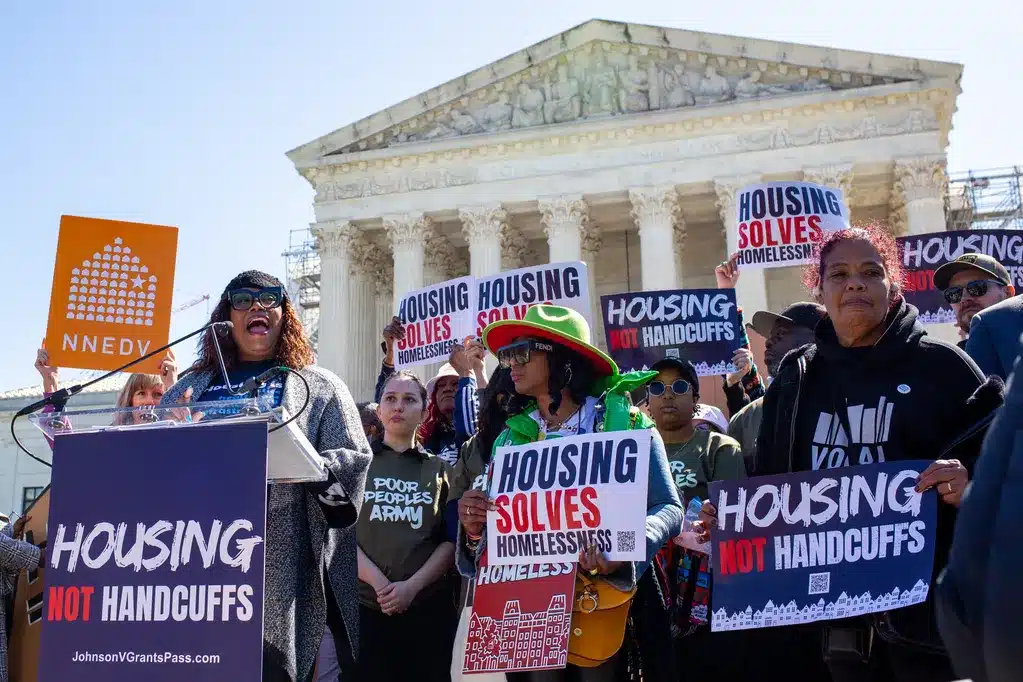
Illustration by Cherezoff via iStock
This article is being co-published by Shelterforce and Progressive City: Radical Alternatives online magazine, a project of Planners Network.
Over the past couple of years a number of state legislatures had pending bills aimed at banning the teaching of “divisive concepts” and “critical race theory” in public institutions. The bills represent an attack on the public memory and understanding of the racialized history of the United States. Though many of the bills failed to make it through recent legislative sessions, some passed and have already been enacted. Even worse, many have been paired with bills that empower political appointees to fire tenured professors, removing academic freedom and providing a mechanism for even broader ideological enforcement of limits on teaching about race.
While bills like those passed in Florida, Tennessee, and Mississippi are dangerous across all the disciplines of higher education, following the spirit of the laws would make it particularly difficult to accurately teach the history of American urban form and housing policy. A whole host of topics—including why our cities look the way they do, how housing discrimination works today, and the segregation still shaping our experiences of spaces each day—requires discussing race.
“Segregation is so much at the heart of how our cities are laid out, and why we zone, and even why racial violence has been part of our history,” says Elizabeth Strom, associate professor of urban and regional planning in the School of Public Affairs at the University of South Florida.
Legislation that makes it dangerous to teach the history of things like redlining, white flight, rural land loss, and the countless federal and local policies that exacerbated racial inequities in housing, will particularly affect urban planning departments and related courses of study, such as urban studies and sociology.
To understand the implications of bills like these on higher education departments, Shelterforce spoke with seven professors from the states in which these bills have passed or been proposed. Due to fears of retaliation, some chose to speak off the record, particularly those without tenure.
Teaching Planning Under Fire
Since 2021, seeking to restrict teaching on “critical race theory,” a graduate-level legal theory about how racism is embedded in laws that is not taught at all K-12 and does not encompass most of what its opponents believe it does, or “divisive concepts,” a set of ideas laid out in a Trump executive order banning diversity training, which mostly boil down to not implying that past racism has any effect on the present, have been making their way onto the voting floors of dozens of Republican-led state legislatures. (Education Week has a bill tracker that covers developments on this front.)
Many bills failed, but not all. For example, in 2022 Mississippi passed SB2113, which banned “critical race theory” education and affects institutions of higher education. More recently, Tennessee Gov. Bill Lee signed into law SB 817, which prevents students from being penalized for disagreeing with “divisive concepts,” effectively banning them from the curriculum. Florida’s SB 266 prohibits required courses for undergraduates from teaching “identity politics” or using curricula “based on theories that systemic racism, sexism, oppression, and privilege are inherent in the institutions of the United States and were created to maintain social, political, and economic inequities.” Institutions that can’t demonstrate adherence lose access to funding, and even professors who are technically not covered by these laws expect to be facing greater scrutiny by the people who championed them, especially where tenure protections have been compromised.
Nonetheless, professors who teach housing policy and development history are pushing back. “The law says you’re not allowed to teach theories that claim that racism is systematic,” says Strom. “I’m not really teaching a theory. I am just relaying the historical record.”
In her planning classes, Strom says she finds it useful to give local examples from Tampa so that students can actually see the effects of segregation and racist housing policy within the city they inhabit. “They can see that our public housing projects were built to be segregated, that there are projects for white people and projects for Black people,” she says. “And then how highways were built so they went through Black neighborhoods. Every place we look in the city, we can find those examples.”
“The word ‘Orwellian’ definitely came to mind,” says Dan Immergluck, professor in the Urban Studies Institute at Georgia State University, of a similar bill in Georgia, HB 1084, which passed in 2022. “The notion that [this bill is] somehow taking politics out, when it’s actually putting politics in a very ideological framework, into the basically micromanagement of curriculum, is very Jim Crow.”
“Those connections between redlining, white flight, the Black middle class, or other middle class groups leaving certain areas” are fundamental, says Allen Hyde, assistant professor of sociology at Georgia Tech. “How do I teach urban sociology without talking about those things?”
None of the professors interviewed for this piece said they had been teaching “critical race theory” per se, but they felt that the use of that term and the attacks on it, nationally and in their states, were a form of intimidation, coming to academia from the political sphere. “There’s a letter of the law and there’s a spirit of the law,” says Jeffrey Lowe, former chair of the Diversity Committee for the Association of Collegiate Schools of Planning, and associate professor in the Department of Urban Planning and Environmental Policy at Texas Southern University (TSU). TSU is one of only two Historically Black Colleges and Universities in Texas, and a relatively small institution. Lowe says he feels that the larger University of Texas institutions like A&M and UT Austin—which are bigger, better funded, and have more legal representation—will be better able to withstand political attacks on academic freedom. (Even so, A&M did recently suspend one of its professors for being passingly critical of the lieutenant governor in a lecture. Though she was not fired, it was not a promising sign.)
“The attack on critical race theory . . . in many ways, it seems to me to be a euphemism for Black resistance,” says Lowe. “Historical accounts, factual things that have happened . . . are being lumped into critical race theory.”
Strom maintains that despite the goal of intimidation, the history is clear and unavoidable. “I suppose that there could be faculty who would be nervous about emphasizing that,” she says. “But it’s just so well established in our field.”
The nerves may come not from the bills on what to teach, but from their combination with attacks on tenure, which, notes Shannon Van Zandt, urban planning professor and executive a ssociate dean of the School of Architecture at Texas A&M, “guarantees the ability to teach and write and research about topics that may not be politically popular.”
Bills like Florida’s SB 266, which requires a board primarily appointed by the governor to review even tenured faculty’s appointments, mean professors at public institutions will need to ensure that political appointees are satisfied with them if they wish to keep their jobs. This could have much farther reaching effects than the more narrowly crafted bills attempting to limit the teaching of certain ideas.
For example, Georgia’s HB 1084 technically only constrains the curricula of K-12 education. But after a 2021 change that allows tenured professors to be fired without faculty input, professors in the state teaching at the college level about the history of segregation, housing discrimination, and urban sociology feel they are under scrutiny through HB 1084’s lens nonetheless.
All the professors who were willing to be quoted for this piece are tenured. None of the non-tenured faculty wanted to be quoted, and others did not respond to interview requests.
Implications
Will these bills influence what gets taught? Maybe not in the short term. Lowe echoes Strom’s resistance to whitewashing history: “As someone who teaches planning history—which is a core course in our curriculum—I must talk about redlining. I must talk about the impacts and unintended consequences, for example, of the Housing Act of 1949.” Most interviewees for this piece mentioned that their institutions and unions (which, in most of these cases are not officially recognized) have said that faculty should keep teaching as they see fit.
Over time however, the atmosphere may nonetheless damage planning programs—in both quality and quantity. “I think it wouldn’t be immediate,” says Immergluck. “But over time, I think you would see fewer courses. I think administrators would discourage courses that cover topics that more explicitly involve race, ethnicity, systematic inequality, systemic inequalities. And so I think you would see fewer resources given to those programs. And so less hiring; I think [departments] would get smaller.”
They will likely also struggle with retention and recruitment of both faculty and students, especially in combination with associated bills banning diversity, equity, and inclusion efforts.
Most faculty interviewed for this piece mentioned that regressive legislation would keep people from wanting to come to their state for education or work in the fields of planning and urban development.
“We lost an African American faculty member last year,” says Van Zandt. “She decided to go to a place . . . that was reckoning with their racist history better than Texas A&M has.” Van Zandt says “there’s no question in my mind” that that faculty member’s departure was influenced by the legislative attacks on curricula and tenure.
Since the weakening of tenure in Georgia, “attracting and retaining faculty is getting to be a significant issue,” says Immergluck, though he notes the attacks on abortion and health care aren’t helping either.
“There’s no way I [would] take a job in Florida right now, if I was on the job market. Absolutely no way,” said a professor of public policy and administration in a state affected by similar laws, who was only willing to speak anonymously due to their untenured status, and who was only remaining in that particular state because of family ties.
Recent graduates have similar reactions. “[Diversity, equity, and inclusion programs] make you feel welcome, overall,” says Trey Smith, a queer Black man from Charlotte, North Carolina, who just completed his master’s in planning from Cornell University and before that, worked as a planner in Cleveland. A lot of students “rely on those initiatives and those programs and services to survive in grad school. I wouldn’t be here without those initiatives.” Smith hasn’t ruled out seeking work in states that have passed laws curtailing intellectual freedom. However, he said that the recent laws made Florida in particular feel like a dangerous place for him to be.
“We’re supposed to be progressing, not regressing,” says Swathi Suvarna, a 27-year-old international student from India who has worked as an architect and also just completed her master’s in planning from Cornell. Suvarna is currently interviewing for jobs, and when asked if she was looking at jobs in Florida or places considering similar laws, Suvarna said no. “I don’t want to be in a space where I’m constantly fighting,” she said.
Reduced recruitment of faculty and students could reduce budgets and hasten the shrinking of these programs, in a vicious cycle.
This cocktail of attacks on teaching accurate history, tenure, and DEI could hurt not only urban planning programs located in those states, but their local governments. Planners work throughout the public and nonprofit sectors. In local government departments, they oversee land use, zoning, transportation, infrastructure, housing, parks and recreation, and even sometimes public health-related programs and departments. Many planners also work with elected officials on policymaking. Without a robust and accurate understanding of how cities and the built environment came to be, and the implications of previous policies and decisions, it becomes significantly more difficult to understand and address issues that relate to physical spaces.
“If people don’t have access to the information, we’re doomed to repeat the past again,” says Tiffany Manuel, of The Case Made and former professor at UMass Boston and UNC Charlotte, who is also on the Shelterforce board. “You have the same kind of policies that recreate racial segregation, because people don’t know how we got here in the first place.” Manuel pointed out that in the absence of historical and systemic context, the focus will be placed increasingly on explaining disparate racial outcomes through individual failings and cultural differences, rather than collective things that could be done to address them.
In addition, if these states’ planning programs suffer, they may struggle to hire planners at all and be forced to turn to more people educated elsewhere, losing the potential advantage of more locally specific knowledge.
Looking Forward
So far, however, faculty remain defiant. “They’re not going to change the way I teach,” says Immergluck.
“We’re going to continue to teach what we think is important to teach,” says Strom. “We will defend our colleagues if they come under attack. And I think we’ll get through this.”
(Aug. 18, 2023. Correction: This article has been updated to reflect that not all of the faculty unions representing professors in the article are unrecognized.)(Aug. 18, 2023. Correction: This article has been updated to reflect that not all of the faculty unions representing professors in the article are unrecognized.)
(Aug. 22, 2023. Correction: This article has been updated to reflect that Jeffrey Lowe is the former chair of the ASCP diversity committee.)






Comments